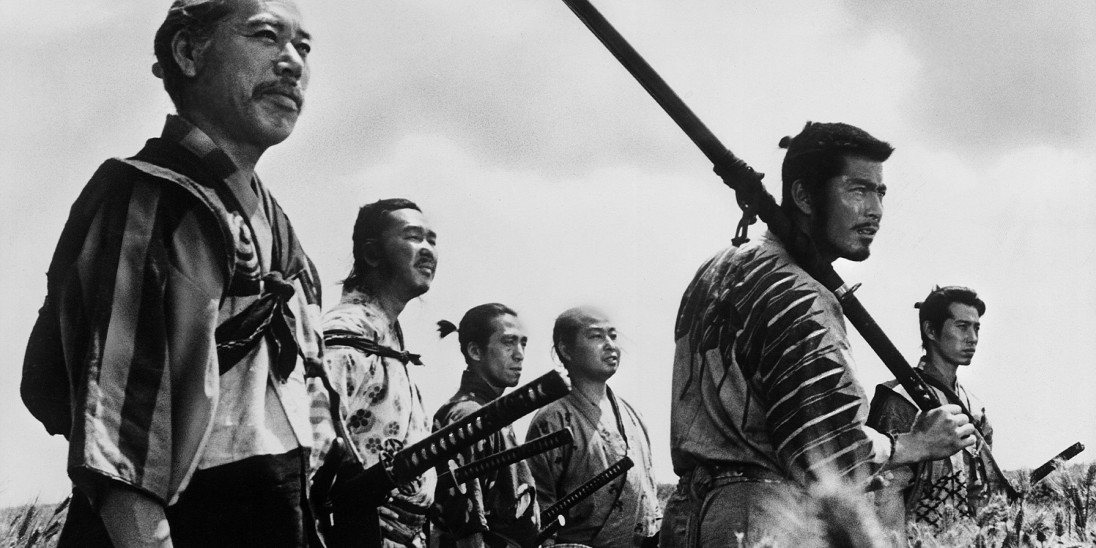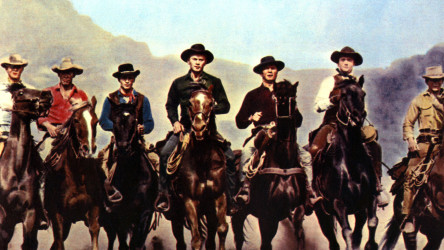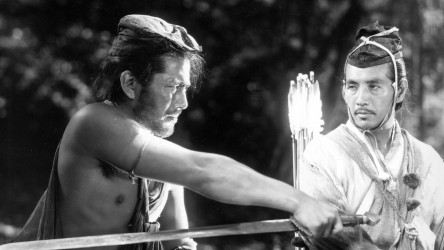Seven Samurai(1954)
This Japanese epic following the adventures of a band of samurai is one of cinema's most influential films.
Certificate
Age group12+ years
Duration170 mins



Akira Kurosawa may not be a name you recognize, yet his influence on the world of cinema and culture as an entirity is that of Shakespeare to poerty or plays. Astronomical. His work has influenced the likes of Quentin Tarantino, George Miller, Steven Spielburg, George Lucas, Sergio Leone, John Sturges and countless more. So many of Kurosawa's films have acted as seminal blueprints for some of the biggest franchises in human history, yet outside of (and even in) Japan his work is severly overlooked by our generation, if not all of the Western world. For instance, "Star Wars: A New Hope" is for the most part a space opera remake of Kurosawa's "The Hidden Fortress", with several transitions, shots and lines neatly stenciled over like my Year 2 art project.
Today, however, I shall be focusing on his most highly regarded film, "Seven Samurai" a slow-burn of a film but a highly entertaining epic. A film that has made it's mark on me, in the same way it has on all of indie, arthouse and blockbuster cinema alike. When talking about a "powerful" film what one is usually referring to is a story "based on real events", it probably stars Meryl Streep and will be about death or grief or someone buying a zoo... Seven Samurai is none of those but is the most powerful film I have ever seen in every sense of the word.
Even if you don't know Seven Samurai, you know it's influence all too well: "The Avengers", "Justice League", "Harry Potter", "Star Wars", "Mad Max" (especially Fury Road), "Lord of The Rings" and "A Bug's Life". As a highly influential piece of cinema alone 5 stars feels like enough already however, it's excellence stems far beyond just it's influence and streches into an exemplar of perfected care for a craft. Pride in your work is important but Seven Samurai's extensive running time and relentless level of effort is extreme. It's a masterwork of cinematic storytelling in almost every sense and film poetry of the highest order. It's Art with a captial "A".
Within the first two minutes a narrative goal, and obstacle thereof, are established. An army of bandits plan to pillage a destitute village once it has harvested. A farmer hiding among some bails bounds down a hill to warn his fellow townspeople of the certain doom they face. After some disagreement of how to react, the town's wisest decides they shall hire the protection of samurai willing to help, so that they may live another day. What follows is the dawn of all assembling scenes that are now common place to superhero blockbusters and all of western action cinema. Six ronin come to their aid: an experienced war veteran; an talented archer; a jolly woodcutter; a pacifist honing their deadly skill; an old ally and a young ronin searching for guidance, desperate to grow up. One samurai remains. A character you may not know but is, in my my very passionate opinion, one of the greatest heroes in all of cinema. Kikuchiyo. This hilariously crazed ronin who seems more of a reluctant drunken dog than a noble hero. However, I have a feeling I will long remember his bombastic personality with fond memories, like an old friend, not to mention his stellar, no, perfect in fact, character arc which almost moved me to tears.
This film is long. Probably the longest I've ever seen clocking in at 3 hours and 30 minutes, (plus a novel 5 minute intermission). There is an obvious difference between saying alot and saying it well. Kurosawa does both to an indescribable regard. While I did find the slow-burn up to the climax somewhat difficult at times, I easily couldn't leave, no matter how hard I tried. The film made me a vow of an epic viscious showdown in the first minute and the film simply taking it's time evolves in to a brilliant cumilative building of tension. When it arrived... it arrived with a punch of adrenaline I felt surging in my veins. Your focus is ever shifting, yet ever intimate, with every character, each one clearly defined and well managed, underscored by wonderful pacing and thorough structuring. Kurosawa created a "feudal system" when it comes to his character's depth and this creates an efficient framework for each character to build off eachother. In storytelling terms it's true genius.
Although I recognized the film's brilliance and really rather enjoyed it, it is easy for someone to find it decidedly boring, yet from a technical standpoint it's textbook perfection. I do not have memory of a film with blocking and placement as good as this one. From a practical angle, no one is obscured in any shot and from a storytelling element every shot packs and conveys so much visual meaning. The camera flows through the set, breathing life everywhere it goes. Not to mention how gorgeous it looks. If this film was a person I would have asked them on a date... and got rejected but that's besides the point. On top of that every edit feels harmonious, and with so many characters and subplots that can be impossible to manage, but Kurosawa is remarkably consistent. It seems that a reoccuring theme with this film is it's own efficency, consistency and organisation. Speaking of subplots, they are no different, each one serving a greater purpose: communicating a character or tying to the greater narratives. And the soundtrack, oh my, is down-right phenomenal, especially the beyond wonderfully rousing Samurai Suite which chips in just when it needs to.
This next detail may seem random, however, if you cannot already tell the film has made a huge mark on cinema. The epic climax that unfolds at the end is more than recognizable, but what stood out to me was that this is one of the earliest uses of pathetic fallacy in film. I imagine everyone is familar with what I call the "rainy showdown" (it's pretty self-explanatory) but the rain that looms in the final battle is more than just a gorgeous visual, but a device in of itself which Kurosawa uses to raise the emotional stakes to eleven. In fact, in every scene Kurosawa includes some sort of elemental action to enhance the scene: the crackling of fire, swirling of smoke, windswept dust cascading the worn path, waving of grass, each one uniting in conjunction with the soundtrack. This ultimately resulted in me watching every gorgeous second through the lens of a hypnotic spell.
Yes, this film is legendary but also seeringly melancholy. Everything has a haunting tint to it in the most grandiloquent sense. This had me practically screaming and near to crying by the end. You know a film is good when you have to take a minute to process it when you're finished, but you know it's amazing when you almost have to take two. A true tornado of emotion, giggles, tears and some stuff in between. It seems as if every aspect of this film was met with tentative and tender care. Not only is this a genius piece of film making, but a film that has impacted so many films, shows and books you have read since. Just a masterpiece. One of if not the greatest film ever made. Need I say more?
Print this review
A hugely enjoyable western which sees a small Mexican village reduced to poverty by a ruthless gang of bandits, building toward a massive shootout.
Certificate

Masterpiece set in ancient Japan about a bandit accused of killing a merchant, though there are wildly different accounts of the incident.
Certificate

Influential samurai action film from Seven Samurai director, Akira Kurosawa.
Certificate